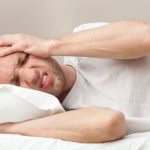
TMJ headache: Symptoms and how to relieve it
While we can’t say for certain, some experts suggest that as many as 10 million Americans may be suffering from temporomandibular joint (TMJ) disorders, including TMJ headache. TMJ syndrome is pain in the jaw joint that can lead to headaches and starts with a variety of other symptoms.
The TMJ connects the lower jaw (mandible) to the skull (temporal bone) in the front of the ear. It comprises muscles, blood vessels, nerves, and bones. TMJ headaches are common in people who suffer from temporomandibular joint disorder. Often people mistake TMJ headaches for recurring tension headaches; however, research shows that TMJ symptoms do not respond to tension headache treatment. TMJ headache pain must be treated in the same way as TMJ syndrome symptoms. Continue reading…


If you find yourself experiencing more severe or frequent headaches in the winter months, it may be due to a vitamin D deficiency, according to new research recently published in Scientific Reports. You are considered deficient in vitamin D when your serum vitamin D level drops below 50 nmol/l, and this correlates to chronic headaches that occur on a weekly basis.
The study was conducted by the University of Eastern Finland, and researchers used data previously collected for the Kuopio Ischemic Heart Disease Risk Factor Study, or KIHD, to draw conclusions about the relationship between vitamin D levels and headaches. Continue reading…


Experiencing a headache while sleeping can be frustrating, as the pain may prevent you from getting adequate rest and negatively impact the upcoming day. The most common type of headaches that occur at night or during sleep are cluster headaches and migraines, as well as hypnic (or “alarm clock”) headaches that awaken the sufferer at approximately the same time every night.
The following article will explore the connection between sleep and headaches as well as what can cause headaches to occur during sleep, how to ease them, and finally, how you can get a better night’s sleep. Continue reading…
If you’re stressed out these days, you’re not alone. Tension or stress headaches are the most common kind of headache which Americans suffer from.
Close to 90 percent of women and approximately 70 percent of men suffer from the aches and pressure of stress headaches at some point in their lives. And many live with the debilitating pain on a regular basis. Continue reading…
Getting a headache after eating is not unusual. However, it is not something people can or should ignore. The symptoms can be uncomfortable enough to impact a person’s life in a significant way.
Getting a headache immediately after eating could feel like pressure between the eyes, throbbing on one side of the head, or a tight feeling across the forehead. Each type of sensation could be due to a different source. A headache after eating could also be a symptom of a medical condition. In many cases, people get headache and nausea after eating, and require medical attention to properly diagnose and treat their condition. Continue reading…